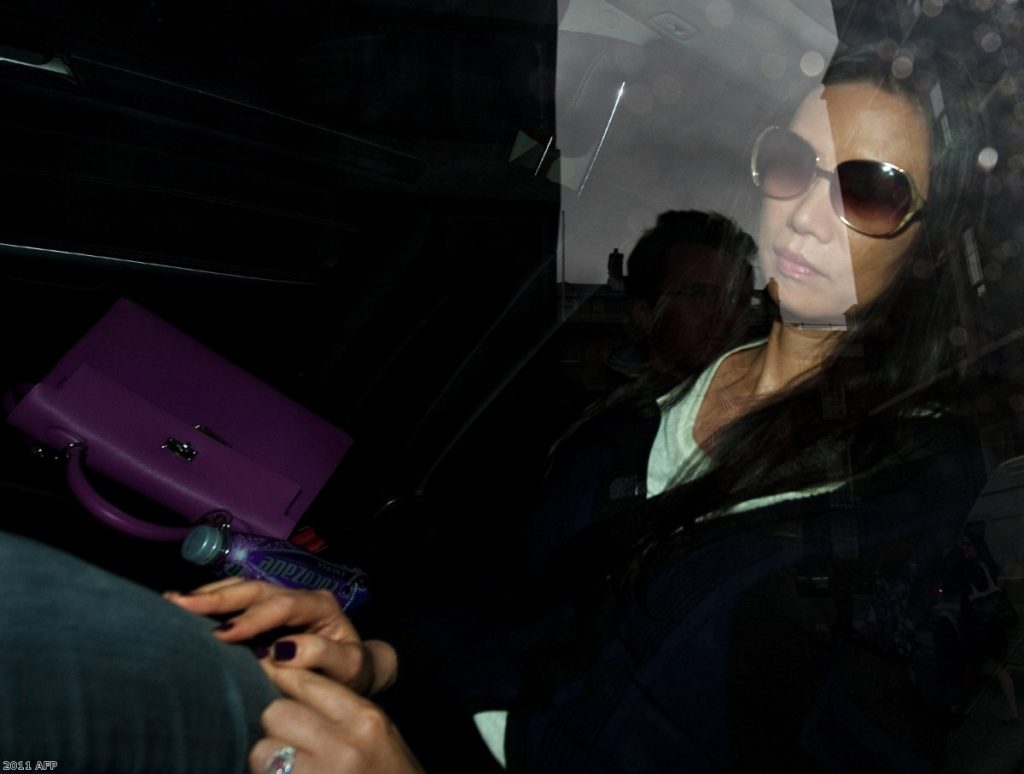Sketch: Wendi’s left hook can’t save Murdoch’s face
Criticise his attacker as much as you like, but today was a good day to fall in love with Murdoch's wife.
By Ian Dunt Follow @IanDunt
It was a very polite, very British attack. After it was over, news channel freeze-frames showed a youngish man calmly trying to place a plate of shaving foam into the face of News Corps' CEO. Wendi Deng, Rupert Murdoch's absurdly young and pretty wife, had spent most of the marathon session gazing bored into the middle distance. But her reaction was astonishing.
Tom Watson later gave her credit for a "good left hook". It wasn't actually. It was a base-level slap with the right. What was amazing was the speed of her reaction. She was like lightening, making a mockery of Rupert's son's delayed reaction.


Here's the schedule. First we'll all talk about how this distracted attention from the serious, important business of holding the Murdochs to account. Then we'll all talk about how lax security rules must be tightened up. The truth is: We weren't getting far with Rupert and James and there's not much you can do to prevent people getting non-metallic objects into a given space. More importantly: we'd already got what we needed from them and I am in love with Wendi Deng.
There was some pitiful stuff afterwards, with Tory MP Louise Mensch praising Murdoch's "extraordinary courage". Getting hit by some foam and then returning to a room is something of an under performance in the courage stakes, I'd suggest. The room was cleared for everyone but Deng, the lawyers and some lobby hacks before the session could continue. Deng kept on looking around like a secret service agent. It was probably at that point that I fell completely in love with her. It’s quite a devastating thing to fall in love with Rupert Murdoch's wife. One finds oneself quickly developing a deep sense of existential despair. Only a significant improvement of the British political landscape can remedy it and I'm pleased there was one to hand.
What needed to be done was done. The Murdochs had submitted to the scrutiny of parliament. Their very presence was a humiliation, given how hard they had fought to escape its clutches. They were brought low. Partly this was a media trainer's trick, but their best efforts to turn the situation to their advantage (News Corp shares rallied during the appearance) did not undo the gain.
Denied a chance at an opening statement, James Murdoch twisted the first question to fit in a major apology or two. Daddy then stepped in, saying simply: "Today is the most humble day of my career." In the straight fight between journalists and MPs, journalists are, frankly, more adept at managing these things. Murdoch went for the headline. Next Rupert and James practiced two kinds of obstruction: Endless talking and monosyllabic answers.
James Murdoch is so seeped in corporate culture he barely says anything of meaning at all. But my, does he talk. He is actually quite a master of speaking in a way which reveals precisely nothing. I can't for one moment summarise anything he said, apart from one precise phrase which arrived at regular intervals: "I have no knowledge of that."
It’s an excellent phrase for avoiding scrutiny, because it can be ably employed at any moment. The rest of the time the words are so lacking in substance that genuine forensic analysis is impossible. It's all "a reflection of the priority of moving forward", or some other management phrase devised so employees could substitute sound for action.
For all his faults, and there are just so many, Rupert Murdoch gives plain answers. They mostly consist of silence followed by 'yes' or 'no'. The opening moments were excruciating as Tom Watson used patience and intelligence to deliver a series of pertinent questions.
"None of your UK staff bring your attention to this serious wrongdoing?" he asked. "Despite the fact that blackmail can result in a 15 year prison sentence, no-one in your UK company brought this to your attention?"
Silence. Then: "The blackmail charge; no."
"Do you think that could be because they thought you'd think nothing of it?"
Silence. "No." Silence. "I can't answer that."
You couldn't help but feel for James Murdoch as he repeatedly came to his father's aid. He had the look of a teenager watching his girlfriend talk to his dad, sure that at any moment a deadly and embarrassing childhood secret would be communicated.
"Mr Watson please, I can address these in some detail," he tried.
"I will come to you, Mr Murdoch," Watson replied curtly.
It was in that moment that the real work of the day was done – in the casual use of authority over an unelected power block.
We could sit and worry that our MPs are largely incapable of forensic analysis or charisma. We could worry that the attack on Murdoch will lead the news where phone-hacking admissions should have. But that would ignore the fact that we were able to witness some spectacular martial arts from Wendi Deng, who, as I believe I mentioned earlier, I am in love with.
Regardless of Deng's impressive violence, the pie attack symbolised something important and undervalued. Of course, it's to be frowned upon. But it is also indicative of the basic anarchy of public accountability. Before the public eye – whether it’s a Commons committee or a soap box in Speakers Corner – things like this happen.
No-one wants pies thrown, but we should all want Rupert Murdoch to be in the kind of room where pies are sometimes thrown. The fact it could happen today proved our work was finished before the day had begun.









